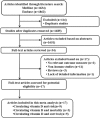Circulating 25-hydroxyvitamin D and lung cancer risk and survival: A dose-response meta-analysis of prospective cohort studies
- PMID: 29137092
- PMCID: PMC5690785
- DOI: 10.1097/MD.0000000000008613
Circulating 25-hydroxyvitamin D and lung cancer risk and survival: A dose-response meta-analysis of prospective cohort studies
Abstract
Lower serum level of 25-hydroxyvitamin D is associated with several negative outcomes. However, previous studies have indicated that 25-hydroxyvitamin D is associated with lung cancer risk and survival, but presented controversial results.PubMed and Embase databases were searched update to August 2017 to identify and quantify the potential association between 25-hydroxyvitamin D and lung cancer risk and survival.Seventeen eligible studies involving a total of 138,858 participants with 4368 incident cases were included in this meta-analysis. Our results showed statistically significant association between 25-hydroxyvitamin D and lung cancer risk and mortality. However, circulating 25-hydroxyvitamin D was not associated with overall lung cancer survival. Furthermore, compared with the lowest circulating 25-hydroxyvitamin D, the highest circulating 25-hydroxyvitamin D is significantly decreased risk of lung cancer risk in male and female. In addition, the highest circulating 25-hydroxyvitamin D was significantly associated with a lower risk in Caucasian and Asian. We also obtained the best fit at an inflection point of 10 nmol/L in piecewise regression analysis, increasing 10 nmol/L dose of circulating 25-hydroxyvitamin D was associated with an 8% reduction in the risk of lung cancer risk and an 7% reduction in the risk of lung cancer mortality. Subgroup meta-analyses in study quality, number of participants, and number of cases showed consistent with the primary findings.The highest circulating 25-hydroxyvitamin D was associated with decreased lung cancer risk and mortality but not overall survival.
Conflict of interest statement
The authors have no funding and conflicts of interest to disclose.
Figures
References
-
- Jemal A, Bray F, Center M, et al. Global cancer statistics. CA Cancer J Clin 2011;61:69–90. - PubMed
-
- Zeng H, Zheng R, Guo Y, et al. Cancer survival in China, 2003–2005: a population-based study. Int J Cancer 2015;136:1921–30. - PubMed
-
- Miller K, Siegel R, Lin C, et al. Cancer treatment and survivorship statistics. CA Cancer J Clin 2016;66:271–89. - PubMed
-
- Ezzati M, Lopez A. Estimates of global mortality attributable to smoking in 2000. Lancet 2003;362:847–52. - PubMed
-
- Kushi L, Doyle C, McCullough M, et al. American Cancer Society Guidelines on nutrition and physical activity for cancer prevention: reducing the risk of cancer with healthy food choices and physical activity. CA Cancer J Clin 2012;62:30–67. - PubMed
Publication types
MeSH terms
Substances
LinkOut - more resources
Full Text Sources
Other Literature Sources
Medical





